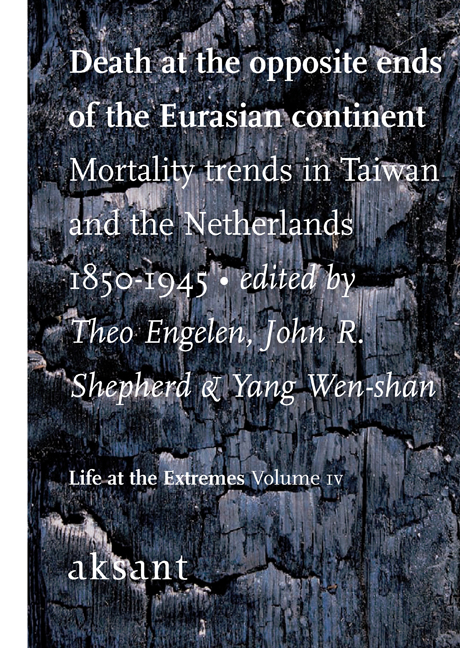 Death at the Opposite Ends of the Eurasian Continent
Death at the Opposite Ends of the Eurasian Continent Book contents
- Frontmatter
- Contents
- Introduction: Death at the Opposite Ends of the Eurasian Continent: Mortality Trends in Taiwan and the Netherlands, 1850-1945
- 1 Trends in Mortality and the Evolution of the Cause-of-death Pattern in the Netherlands: 1850-2000
- 2 Trends in Mortality and Causes of Death in Japanese Colonial Period Taiwan
- 3 Mortality in the Netherlands: General Development and Regional Differences
- 4 Regional and Ethnic Variation in Mortality in Japanese Colonial Period Taiwan
- 5 An Outline of Socio-medical Care in the Netherlands, 19th and Early 20th Centuries
- 6 An Overview of Public Health Development in Japan-ruled Taiwan
- 7 The Demographic History of Smallpox in the Netherlands, 18th-19th Centuries
- 8 Anti-malaria Policy in Colonial Taiwan
- 9 Maternal Mortality in Taiwan and the Netherlands, 1850-1945
- 10 Maternal Depletion and Infant Mortality
- 11 The Massacre of the Innocents: Infant Mortality in Lugang (Taiwan) and Nijmegen (the Netherlands)
- 12 Illegitimacy, Adoption, and Mortality Among Girls in Penghu, 1906-1945
- 13 How Reliable is Taiwan's Colonial Period Demographic Data?: An Empirical Study Using Demographic Indirect Estimation Techniques
- References
Introduction: Death at the Opposite Ends of the Eurasian Continent: Mortality Trends in Taiwan and the Netherlands, 1850-1945
Published online by Cambridge University Press: 22 January 2021
- Frontmatter
- Contents
- Introduction: Death at the Opposite Ends of the Eurasian Continent: Mortality Trends in Taiwan and the Netherlands, 1850-1945
- 1 Trends in Mortality and the Evolution of the Cause-of-death Pattern in the Netherlands: 1850-2000
- 2 Trends in Mortality and Causes of Death in Japanese Colonial Period Taiwan
- 3 Mortality in the Netherlands: General Development and Regional Differences
- 4 Regional and Ethnic Variation in Mortality in Japanese Colonial Period Taiwan
- 5 An Outline of Socio-medical Care in the Netherlands, 19th and Early 20th Centuries
- 6 An Overview of Public Health Development in Japan-ruled Taiwan
- 7 The Demographic History of Smallpox in the Netherlands, 18th-19th Centuries
- 8 Anti-malaria Policy in Colonial Taiwan
- 9 Maternal Mortality in Taiwan and the Netherlands, 1850-1945
- 10 Maternal Depletion and Infant Mortality
- 11 The Massacre of the Innocents: Infant Mortality in Lugang (Taiwan) and Nijmegen (the Netherlands)
- 12 Illegitimacy, Adoption, and Mortality Among Girls in Penghu, 1906-1945
- 13 How Reliable is Taiwan's Colonial Period Demographic Data?: An Empirical Study Using Demographic Indirect Estimation Techniques
- References
Summary
Death is often referred to as the great equalizer. In the end, it is said, it makes up for differences in life chances among social classes, political entities and historical periods. The sad truth is that although every human being inevitably dies, there is a vast range in the causes and timing of mortality, largely determined by location in space and time and social position. This volume looks into the similarities and the differences in mortality at the two ends of the Eurasian continent by taking the Netherlands and Taiwan as case studies representing the West- European and Chinese mortality regimes. This choice is no coincidence. Two centuries ago Thomas Malthus distinguished between a low pressure population system in Western Europe and a high pressure system in Asia, specifically China. In his analysis of the forces determining rates of population growth, Malthus and many of his followers, identified mortality as the major variable in Asia (“positive checks”), and limits on fertility and nuptiality as the major variables in Europe (“preventive checks”) (see among many others: Malthus 1798; Hajnal 1965 and 1981; Wrigley and Schofield 1981; Engelen and Wolf 2005; but also Lee and Wang 1999). Malthus argued that in China universal marriage and uncontrolled fertility led to growth that was only constrained by high mortality (thus, ‘high pressure’), while in Western Europe, growth was limited by constraints on fertility stemming from late marriage and high rates of celibacy, with mortality playing a smaller role (‘low pressure’).
The group of Taiwanese, Dutch and US scholars contributing to this book participates in a research project called Population and Society in Taiwan and the Netherlands, dedicated to the comparative study of demographic, social and economic conditions in China and Europe in pre-modern times. The project has already produced three volumes, respectively, on differences in marriage and family systems (Engelen and Wolf 2005), on differences in fertility (Chuang, Engelen and Wolf 2006), and a case-study comparing marriage and fertility in Nijmegen and Lugang, a Dutch and a Taiwanese town (Engelen and Hsieh 2007). The project takes Taiwan and the Netherlands as representatives of the extremes of Eurasia and of Malthus's ideal types. Of course, within territories as vast as China and Europe one finds many differences. Still, the program is guided by the idea that the differences within the two societies are minor compared to the differences between the societies.
- Type
- Chapter
- Information
- Death at the Opposite Ends of the Eurasian ContinentMortality Trends in Taiwan and the Netherlands 1850–1945, pp. 7 - 16Publisher: Amsterdam University PressPrint publication year: 2012


